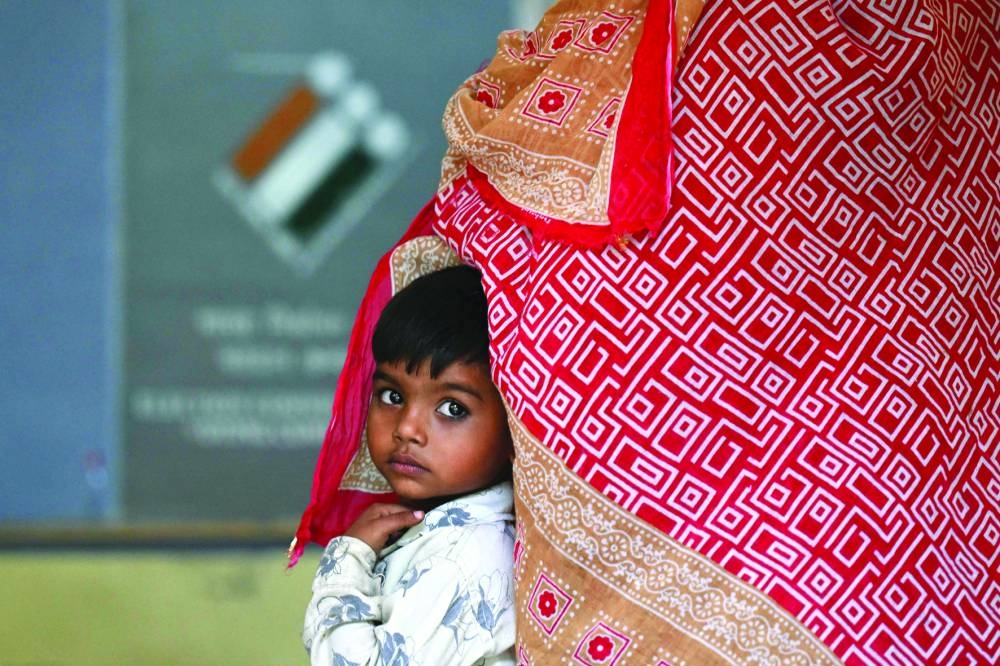Indian voters braved temperatures of nearly 45° Celsius (113° Fahrenheit) in parts of the country as they headed on Saturday to polling stations in the penultimate phase of the world’s largest election.
More than 111mn people in 58 constituencies across eight states and federal territories are eligible to vote in the general election’s sixth phase, which recorded turnout of 49.2% at 3pm, with three hours of polling left.
The overall turnout in the same phase of the last election in 2019 was about 63%.
Among those casting their ballots early on Saturday in the capital New Delhi was Rahul Gandhi, leader of the opposition Congress party and the main rival of Prime Minister Narendra Modi – whose Hindu-nationalist Bharatiya Janata Party (BJP) is expected to win a third consecutive term.
Gandhi was accompanied by his mother, Sonia Gandhi, and sister, Priyanka Vadra.
A son, grandson and great-grandson of former prime ministers, Gandhi paused after voting to take a selfie with his mother Sonia but did not speak to crowds of reporters.
The scion of a dynasty that dominated Indian politics for decades, he was convicted of criminal libel last year after a complaint by a member of Modi’s party.
His two-year prison sentence saw him disqualified from parliament until the verdict was suspended by a higher court.
After voting, Delhi Chief Minister Arvind Kejriwal, 55, leader of the opposition Aam Aadmi Party (AAP), urged citizens: “Please vote, use your right to vote, and vote against dictatorship.”
Kejriwal was arrested in March in a long-running graft case and detained for several weeks before the Supreme Court granted him bail earlier this month and he returned to the campaign trail.
Investigators “had no proof and yet they jailed him”, opposition voter Yogesh Kumar, 42, told AFP. “This is a blunt show of power.”
Congress is spearheading an opposition alliance of more than two dozen parties competing jointly against Modi, including the AAP.
Kejriwal’s organisation grew out of an anti-corruption movement a decade ago – its name means Common Man’s party – and has been elected to office in the Delhi region and the state of Punjab, but has struggled to establish itself as a nationwide force.
In February, authorities froze several Congress bank accounts as part of a running dispute over income tax returns filed five years ago, a move Gandhi said had severely impacted the party’s ability to contest the election.
“We have no money to campaign, we cannot support our candidates,” the 53-year-old told reporters in March.
Voting in the elections began on April 19 and will conclude on June 1, with results due on June 4.
Paramedics were on hand with oral hydration salts at polling stations in Delhi, where mist machines, shaded waiting areas and cold water dispensers have also been installed by the Election Commission due to concerns about the heat.
“We hope that people will overcome the fear of the heatwave and come and vote,” Delhi Chief Electoral Officer P Krishnamurthy told Reuters.
Modi also urged people to “vote in large numbers” in a message on Saturday on social media platform X.
It was not clear which party would gain from a lower turnout.
The temperature in the capital hovered around 42C (107.6F) but felt like 49C (120.2F) at 2pm, the weather department said, prompting many voters to question why polls were not held when the weather was “more conducive”.
At 3pm, turnout in the city stood at 44.5%.
At a school in the Trilokpuri area that was being used for polling, sheets and tarpaulin were strung up in the courtyard to provide shade to voters queuing up despite the heat.
“If we sit at home saying it is hot outside, who will vote?” said housewife Bhuwneshwari Pillai, 32, fanning herself with a sheet of paper and mopping her brow with a towel.
In some parts of the northern state of Haryana, people living near polling booths also pitched in to help voters beat the heat, handing out free cold drinks and dried fruits.
Price rises and a lack of jobs were two of the major issues mentioned by voters to Reuters on Saturday when asked about the factors that determined their vote.
“Our youth are unemployed, the prices of essential commodities have sky-rocketed. We have come to vote for the candidate who resolves these issues,” said Ghulam Qadir Chouhan, 75, in the northern state of Jammu and Kashmir’s Anantnag region.
In Delhi, Nishu Singh, 43, who travelled from a neighbouring town to vote, said her ballot was “for the country’s development”.
For social scientist Savitha Jha, who was voting in Haryana’s business hub Gurugram, which shares a border with Delhi and saw Hindu-Muslim clashes last year, the election was a chance to ensure security for all.
“I’m voting for internal security and for external security of the nation and everyone in it, not just any one community,” she said.
While the heatwave was a concern in Delhi, a cyclone that is expected to hit land today was being closely watched in eastern Odisha and West Bengal, parts of which are also voting on Saturday.

A child is seen at a polling station during the sixth phase of voting in India’s general election, in Sakatpur village on the outskirts of Gurgaon, on Saturday.
